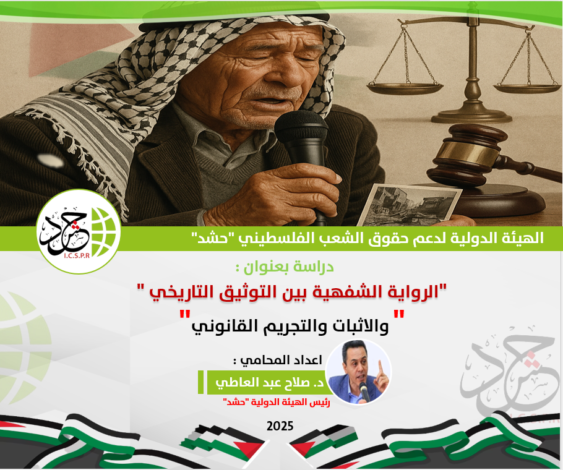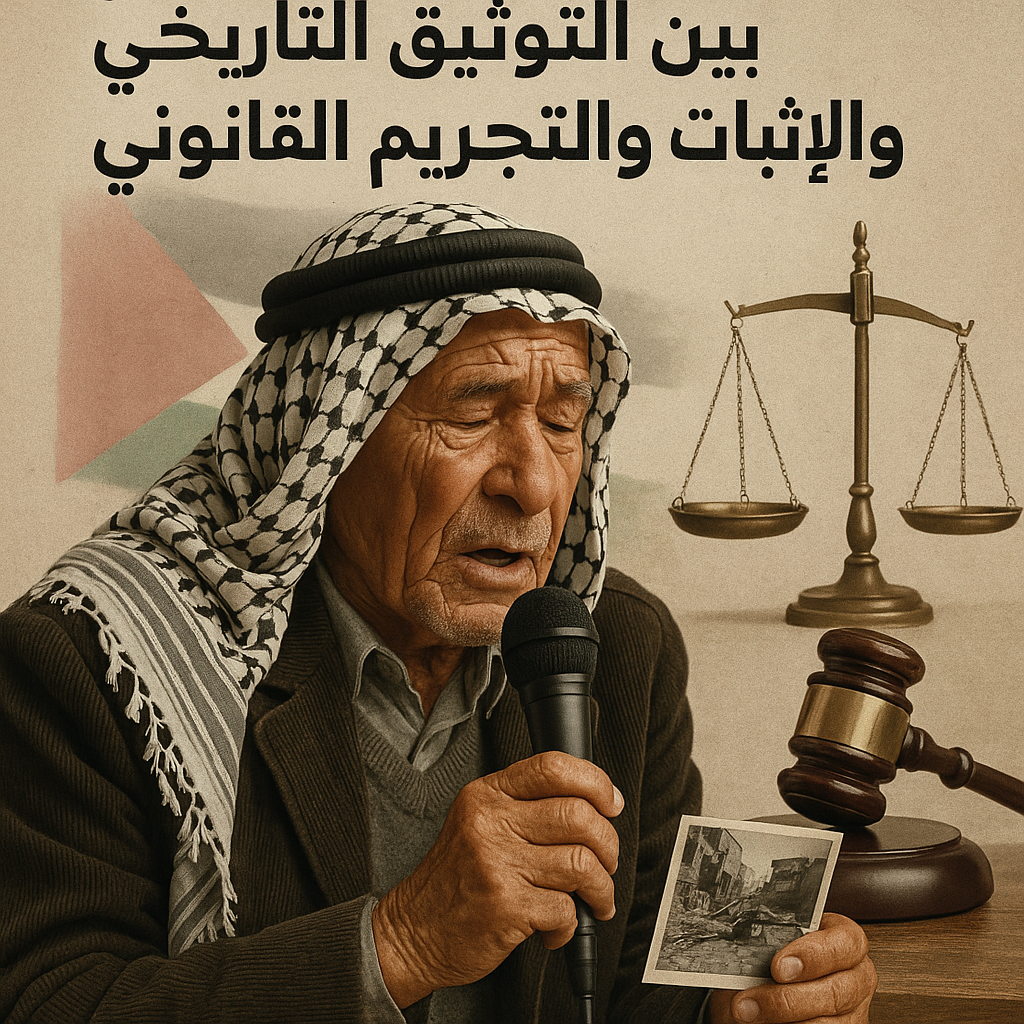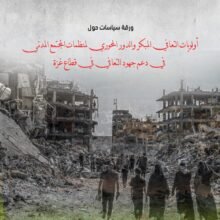
ICSPR Publishes a Groundbreaking Study Titled Oral Testimony Between Historical Documentation, Legal Proof, and Criminalization Emphasizing the Role of Oral Narratives in Prosecuting Israeli Occupation Leaders Before International Courts
Date: May 20, 2025
Press news
ICSPR Publishes a Groundbreaking Study Titled: “Oral Testimony Between Historical Documentation, Legal Proof, and Criminalization,” Emphasizing the Role of Oral Narratives in Prosecuting Israeli Occupation Leaders Before International Courts
The International Commission to Support Palestinian Rights (ICSPR) has released a groundbreaking legal study entitled “Oral Testimony Between Historical Documentation, Legal Proof, and Criminalization,” authored by Dr. Salah Abdel Ati, lawyer, researcher, human rights activist, and Chairman of the Commission. This study addresses one of the most critical issues in the realm of legal and national documentation: the Palestinian oral narrative and its pivotal role in proving international crimes committed by the Israeli occupation authorities against the Palestinian people, and in holding perpetrators accountable at both the national and international levels.
Oral Testimony: A National Memory and a Legal Tool
The study, using a descriptive, analytical legal methodology, explores the significance of oral testimony as a crucial means of preserving Palestinian history, documenting grave violations and crimes, and presenting them as admissible evidence before international criminal courts. It draws upon the testimonies of victims and witnesses who lived through massacres and violations, from the Nakba of 1948 to the repeated wars on Gaza, most recently the 2023 genocide.
The study emphasizes that oral testimony is not only a method of documenting suffering but also a vital component in building legal case files to prosecute Israeli war criminals and ensure they do not evade justice, based on the principle of non-impunity for international crimes.
The Study Identifies a Gap in Official Palestinian Documentation
The study highlights the weakness of official Palestinian efforts in legal documentation and international accountability, and the failure to effectively utilize Palestine’s membership in the International Criminal Court. It notes that comprehensive case files holding the occupation accountable since the Nakba have not been submitted. Instead, the Palestinian Authority has referred only limited cases, such as the 2014 settlement file.
It concludes that the Palestinian experience in documenting oral narratives, especially at the official level, has not met the gravity of the challenges. This calls for the formulation of a comprehensive national strategy that involves civil society institutions, universities, and research centers, and leverages technology to preserve the Palestinian memory.
Means of Evidence Before International Courts
The study provides a comprehensive overview of internationally recognized means of legal proof, clarifying the standing of oral testimony alongside written, visual, and audio evidence. It affirms that recorded testimonies, interviews, and even hearsay can be admissible in international courts under the principle of “judicial conviction.”
It also notes that courts such as the International Criminal Tribunal for the former Yugoslavia and the Rwanda Tribunal relied heavily on oral testimonies, unlike the Nuremberg Trials, which focused on documents—demonstrating the flexibility of international criminal justice in accepting oral narratives, provided they are verified and credible.
Towards Accountability: Criminal and Civil Responsibility of the Occupation
The study defines the elements of criminal and civil legal responsibility of the Israeli occupying state, affirming that crimes committed against Palestinians for decades fall under the classification of war crimes and crimes against humanity. This enables the prosecution of both commanders and executors before international courts, particularly under the Geneva Conventions and the Rome Statute of the International Criminal Court.
It also stresses that Israel’s responsibility is not limited to individuals but extends to compensating the Palestinian people for both material and moral damages, including the destruction of property, killings, forced displacement, and ethnic cleansing.
International and National Obstacles to Accountability
The study deeply examines key national and international challenges impeding the prosecution of Israeli war criminals, most notably:
-
The absence of a unified Palestinian law for prosecuting international crimes.
-
The dominance of major powers over the UN Security Council and the U.S. bias toward Israel.
-
The retreat of some European countries from applying universal jurisdiction for political reasons.
-
Weak international judicial cooperation and lack of serious Palestinian political will.
-
Failure to request international protection or to establish a special tribunal under the “Uniting for Peace” resolution.
Strategic Recommendations to Preserve Memory and Achieve Accountability
The study presents a comprehensive set of practical recommendations to preserve the remaining Palestinian oral narratives and institutionalize documentation and accountability, including:
-
Developing a national strategy to document oral testimonies from all Palestinians in the homeland and the diaspora.
-
Establishing a National Center for Palestinian Memory within universities and research centers in partnership with human rights organizations.
-
Enhancing engagement with international legal mechanisms and employing technology to archive testimonies.
-
Launching a global solidarity campaign to document Israeli crimes, similar to the BDS movement.
-
Calling for the activation of the principle of universal jurisdiction and the creation of a special tribunal to hold Israel accountable since 1948.
The Importance of the Study: Bridging the Legal Gap and Documenting Palestinian Memory
ICSPR affirms that this study constitutes a significant legal and academic contribution to the Palestinian and Arab human rights library. It presents a strategic vision based on the internationalization of the conflict and the documentation of the Palestinian narrative as a tool for legal accountability.
This study comes at a critical moment amidst escalating Israeli crimes and the lack of international accountability, demanding the mobilization of all legal and academic capacities, and the strengthening of partnerships among the components of the Palestinian political system, to build a genuine legal path that upholds victims’ rights and puts an end to impunity.
To read the full study, click here






